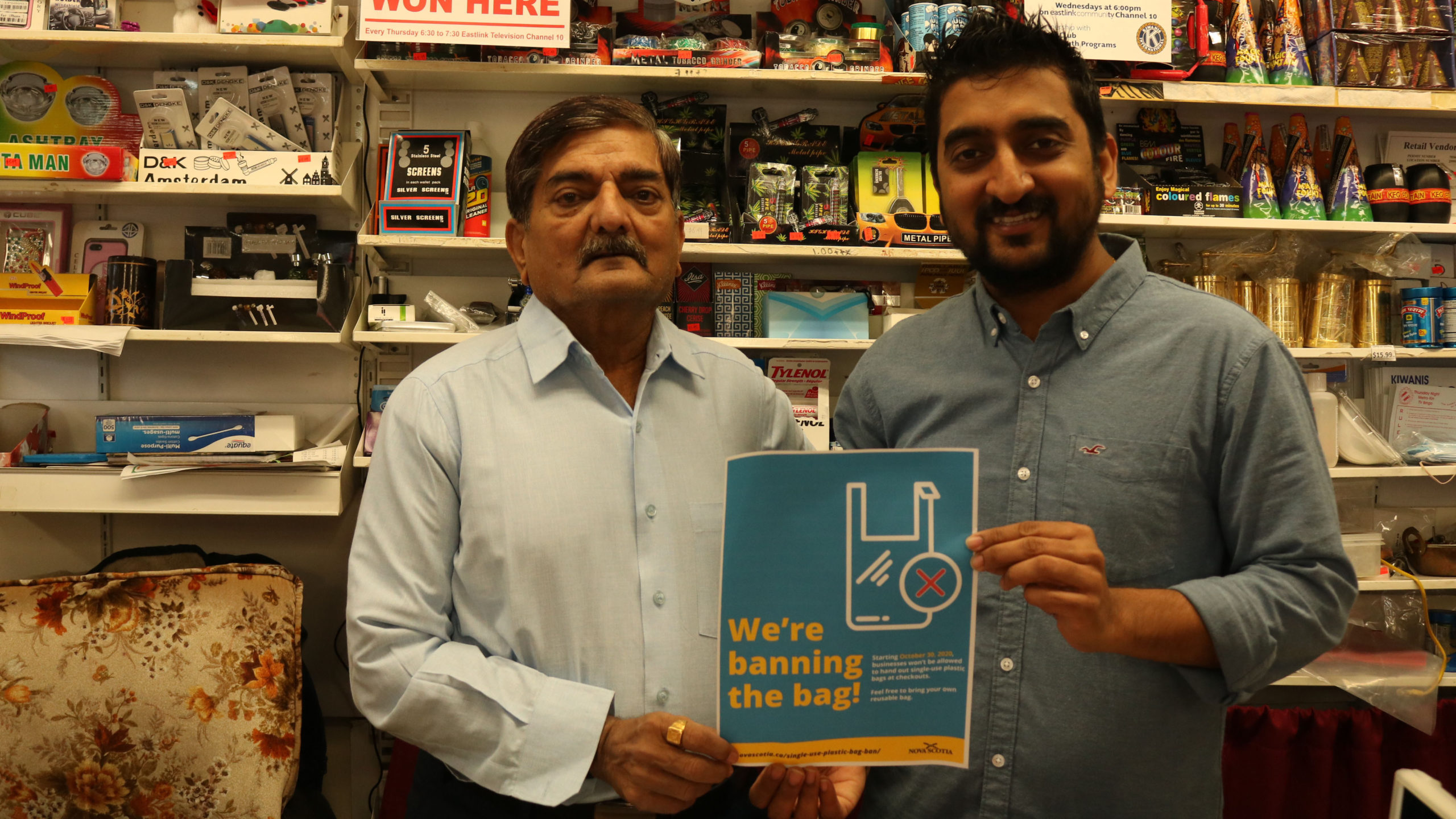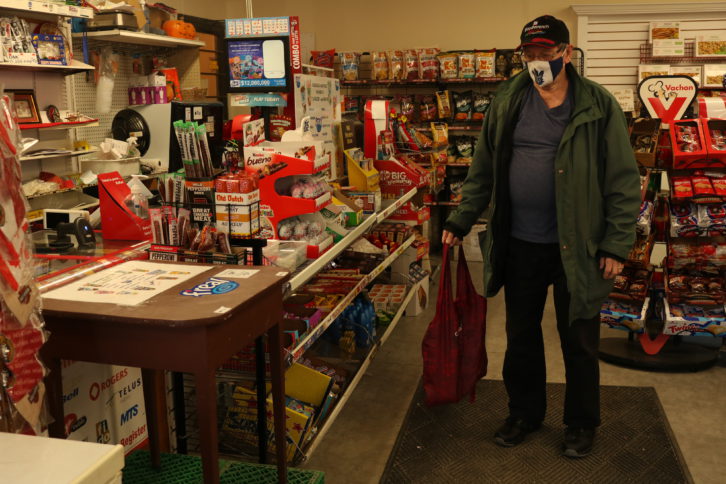Plastic bag ban sees smooth transition, saves money for Halifax business
Canadians use up to 15 billion plastic bags every year, says federal government

caption
Krunal Shah and his dad pose with a government poster he says helped communicate the new rules to customersThe owner of TJ’s Grocery on Main Avenue in Halifax was, at first, “a little scared” when the plastic bag ban was first announced to happen in Nova Scotia over a year ago.
“What do we do now?” Krunal Shah, the owner, recalled. But he said the government provided enough time and notice to implement the changes, and customers have been “quite adaptive.”
“I think the transition was smooth, because we had, I would say, good enough time to move from one step to another,” Shah said in an interview.
TJ’s has been in business for almost two years and sells and assortment of grocery and convenience goods. Related stories
The ban, which began on Oct. 30, 2020, applies to all single-use plastic bags – specifically targeting check-out bags – and has a few exceptions, such as for wrapping meat or carrying liquids.
In a recent regulatory burden reduction report, the Nova Scotia government said that the ban saved businesses $5 million province-wide to the end of 2020.
Shah said the ban has saved his business money – not enough to pay another bill exactly – but still, some.
He said that about 85 per cent of his customers bring in their own bags. TJ’s sometimes offers reusables and paper bags, but they’re not always available. Maybe once or twice – especially during bad weather – Shah says a customer will give him negative feedback.
The ban legislation does not mandate businesses to offer alternatives, but they can for a fee or for free. Businesses are also not allowed to offer compostable or biodegradable plastic bags, which do not compost properly in composting facilities.
A spokesperson for Nova Scotia’s department of environment said in an email that, generally, compliance hasn’t been an issue and they haven’t given any fines to date.
Instead, they’re focused on helping businesses understand the ban.

caption
A customer visits TJ’s Grocery and brings a reusable bagAtlantic Canada took the lead
“Atlantic Canada really was a leader in taking steps to say … maybe we can reduce and ultimately eliminate our reliance on single-use plastic bags,” Jim Cormier, the Atlantic director of the Retail Council of Canada (RCC), said in an interview.
Nova Scotia consulted the RCC when it designed the ban.
“We were able to come up with some compromises that allow government to meet its environmental goals, but yet without needlessly punishing consumers and retailers,” Cormier added.
Cormier said RCC did not have “a strong position” on the plastic bag ban but advocated for harmonization in the rules across the Atlantic provinces.
He also said that retailers haven’t had any concerns with the ban in Nova Scotia, as many were able to work out issues in Prince Edward Island, which implemented a ban the year before.
“It all depends on the will of the people in different parts of the country and here in Atlantic Canada, there hasn’t been a backlash with these actions,” Cormier said.
Three of the four Atlantic provinces have a province-wide ban – the exception being New Brunswick.
Plastics in the environment
The environmental impacts of plastic pollution were summarized in a 2020 Health Canada assessment, which noted plastics take several hundred years to degrade, they interfere with plant and animal life, and they have toxic effects.
A 2019 Deloitte study on the plastic industry said that only nine per cent of plastics were recycled in Canada in 2016, with one per cent leaked into the environment and nearly the rest heading to landfills. However, that one per cent leakage represents 29,000 metric tonnes annually.
Closer to home in Nova Scotia, a multi-year survey ending in 2019 of the Bay of Fundy’s sea floor found 47 pieces of garbage at 26 locations. Seventeen of those items were plastic bags, and another seven were plastic items. When the researchers extrapolated their data to represent the entire Bay, they said there may be 1.8 million pieces of garbage on the sea floor – and based on that survey – over a third of that may be plastic bags.
Plastic bag ban is just the beginning
The federal government set out a plan for achieving zero plastic waste by 2030 and intends to ban plastic bags, straws, stir sticks, six-pack rings, cutlery, and hard-to-recycle food containers by the end of 2021.
Nova Scotia’s bag legislation leaves open the room to add other kinds of single-use products to it as well.
For TJ’s owner, Shah, the plastic bag ban is just the start for making a difference.
“If you want to completely save [the environment] … there has to be a first step,” Shah said. “You cannot reach the sky overnight.”
About the author
Nicole Foussekis
Nicole Foussekis (she/her) lives and writes in Mohkinstsis, also known as Calgary, on Treaty 7 land in Alberta. She is an avid daydreamer and...
